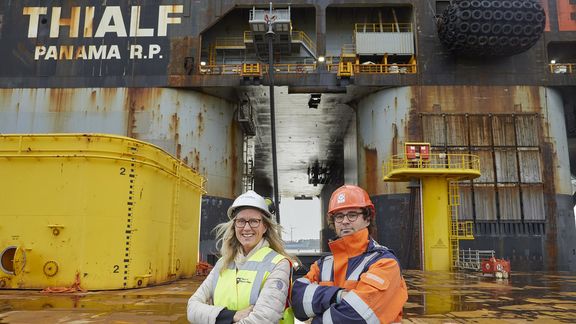Annual Report outlines developments in the port and the Port of Rotterdam Authority
- Port recovers from 2020 coronavirus dip
- Investing in the future: energy transition and digitisation
In 2021, the port of Rotterdam handled as much freight as it did in 2019 before the pandemic. Total throughput increased by 7.3% compared to 2020. A highlight is the number of containers handled, which rose to a record 15.3 million TEUs.
Increased turnover and lower costs resulted in the Port of Rotterdam Authority achieving earnings of €512.2 million (2020: €477.5 million) before interest, taxes, depreciation and amortisation. The energy transition is gaining ever more momentum in the port. The investment decision for various projects was taken last year, whereas for others it is planned for 2022. This and much more can be read in the annual report under the heading ‘Building the port of tomorrow together’.

In terms of security, whether connected with shipping, onshore activities or ICT systems, the port did not suffer any major incidents or accidents in 2021.
In financial terms, the Port Authority had a good year. Revenues rose by 2.6% to €772.7 million, while operating expenses fell by 5.5% to €260.5 million. Earnings before interest, taxes, depreciation and amortisation (EBITDA) rose by 7.3% to €512.2 million.
Efficiency
The Port Authority is investing in digital infrastructure to make logistics chains that run through Rotterdam even more efficient and sustainable. Examples include digital planning tools Routescanner and Nextlogic and the blockchain service Quay Connect that was introduced in 2021. Quay Connect makes exporting to the UK more efficient.
Completing major projects demands patience. Six years after the Paris Agreement on climate change was concluded, a series of large, impactful projects are in the final decision-making phase both at the Port Authority and in the business community. Recently, for example, the four companies that will be using the Porthos CO2 transport and storage system have signed the final contracts, a large shore power facility has been completed in the Calandkanaal, and Shell has begun construction of a large biofuel plant in Pernis. This year, investment decisions are expected to be taken on projects such as Porthos, the hydrogen pipeline HyTransPort running through the port area, and the first large green hydrogen plant.
35% of Dutch carbon reduction
The energy transition-related projects that are now in the pipeline are jointly set to reduce carbon emissions by a total of 23 million tonnes. This represents 35% of the total Dutch carbon reduction target for 2030. In addition, the Port Authority is working with a number of partners towards realising the goal of importing hydrogen for industry in Rotterdam and elsewhere. Importing 1 to 2 million tonnes of hydrogen by 2030 is feasible and will lead to 10 to 20 million tonnes of additional carbon reduction. In order to realise these projects, the Port Authority is in talks with various governments about a stimulating and effective government policy aimed at the creation of nitrogen space, the construction of infrastructure for new and existing energy carriers, the smart use of charges, subsidies and obligations for companies, and, above all, speed of action.
The title of the 2021 Annual Report is ‘Building the port of tomorrow together’. The report provides insight into the performance and results of the Port of Rotterdam Authority in 2021. The full Annual Report is available in Dutch only. International readers can download the English highlights.